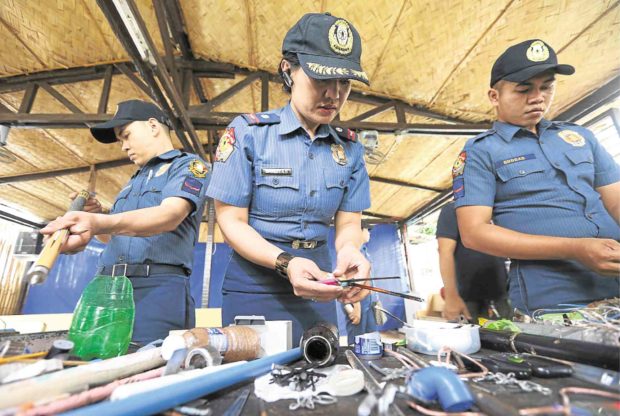
Police inspect drug paraphernalia and weapons seized after a prison raid. —MARIANNE BERMUDEZ
CITY OF SAN FERNANDO— “Even if we are diligent in our antidrug campaign but if our procedures and pleadings are not in order, our efforts would only be wasted.”
That advice was offered by Supt. Judy Lopez, chief of the Central Luzon police’s legal office, to policemen who undertook a two-day capability enhancement training on the procedures set by the Comprehensive Dangerous Drugs Act of 2002 (Republic Act No. 9165).
The training was attended by 94 police chiefs in 19 towns and two cities in Pampanga province, investigators, arresting officers, officers of the Drugs Enforcement Group and Public Safety Company and intelligence operatives.
Designed by the National Police Commission (Napolcom), the training was conducted a year after President Duterte took office and launched the antidrug campaign, “Tokhang,” renamed Project Double Barrel Reloaded.
Rodolfo Santos Jr., Napolcom Central Luzon director, said Pampanga Gov. Lilia Pineda had requested the training to help the police secure the conviction of drug suspects.
Around 50 percent of drug cases filed by the police nationwide had been dismissed on technicalities, Lopez said, citing reports from the Philippine National Police oversight committee.
In Central Luzon, the police filed 6,913 cases against 10,565 suspected drug pushers and users from July 1, 2016, to July 4 this year. Most of the cases await trial.
Santos said a study or even a review of RA 9165’s operational procedures had become necessary because there was no specialized course on narcotics in the Philippine National Police Academy.
He said RA 9165 tasked mainly the Philippine Drug Enforcement Agency (PDEA) to carry out the law’s provisions.
Before Mr. Duterte assumed office, PDEA and PNP “coordinated whenever possible,” he said. “Now, the police are more involved so they should improve their mastery [of the procedures and guidelines of RA 9165].”
Santos said he found the first day of training to be an eye-opener. “Even experienced ones (trainees) showed to be not keen on the details of operational procedures,” he said.
Some admitted to taking shortcuts or mishandling evidence depending on the situation before, during or after operations, he said.